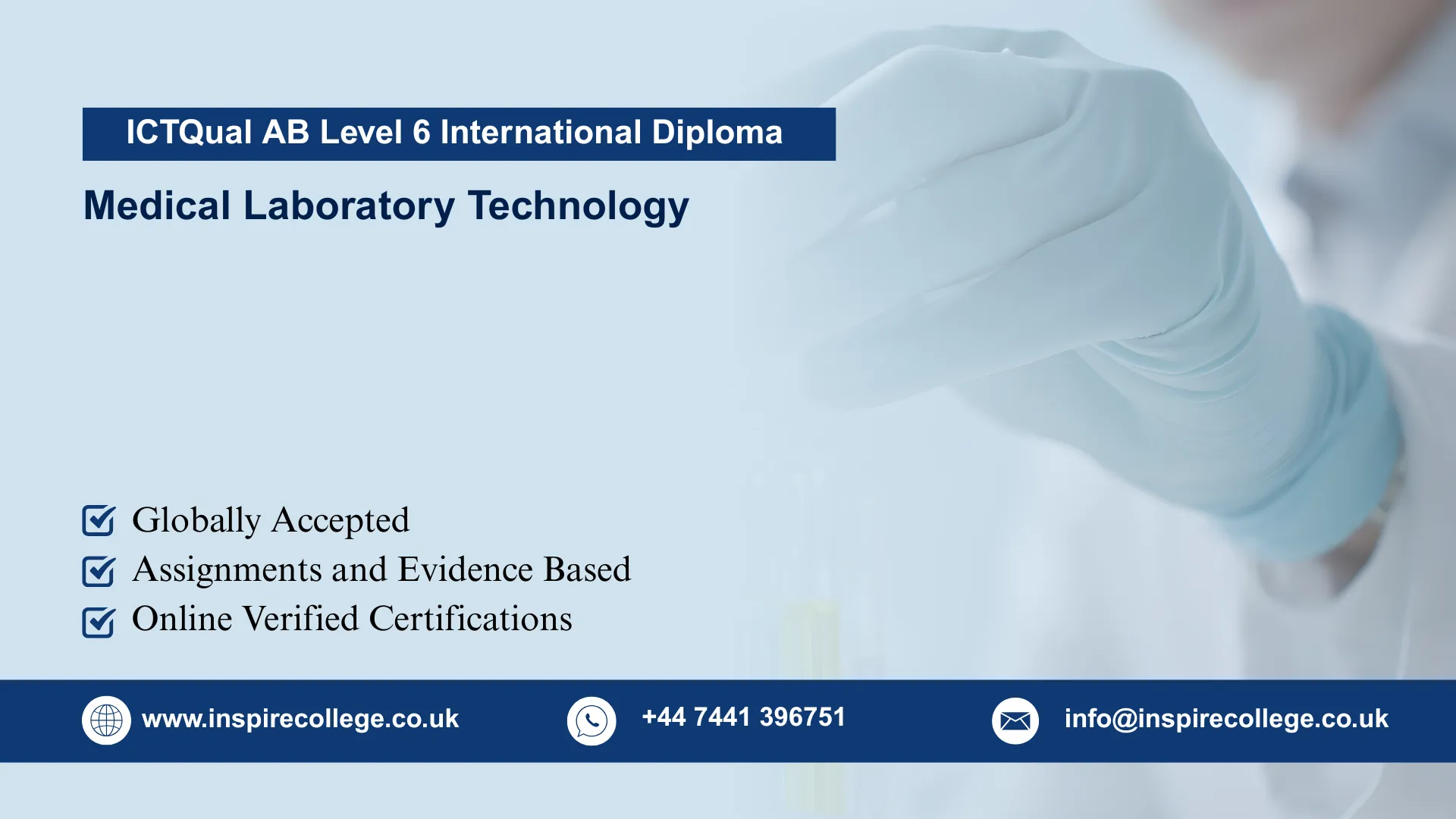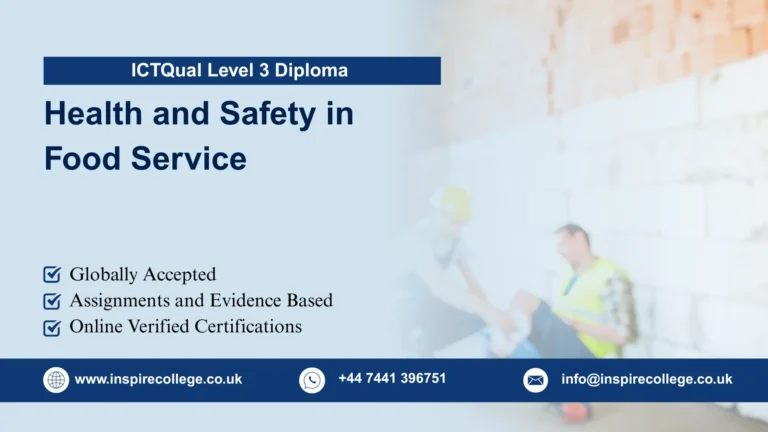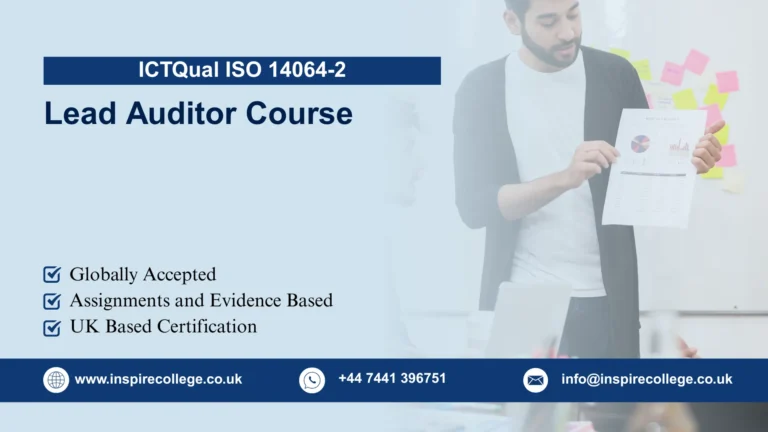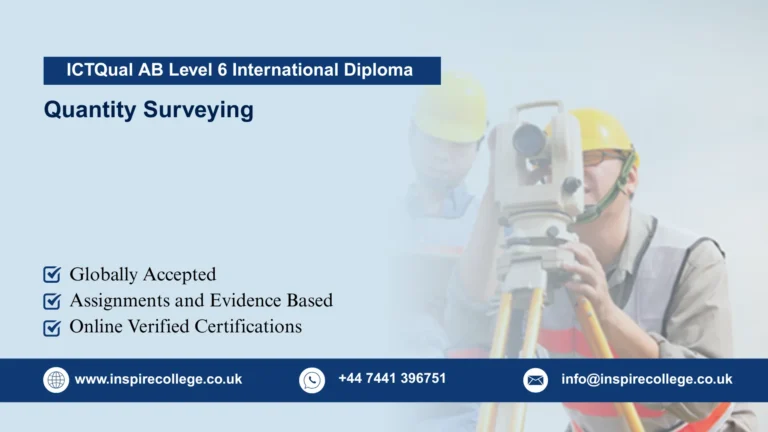
ICTQual AB Level 6 International Diploma in Medical Laboratory Technology
The ICTQual AB Level 6 International Diploma in Medical Laboratory Technology is designed to meet the growing global demand for skilled laboratory professionals who play a critical role in healthcare, diagnostics, and research. This advanced programme equips learners with comprehensive knowledge of laboratory techniques, medical testing procedures, and quality assurance standards, making it essential for both fresh learners and experienced healthcare professionals aiming to elevate their expertise.
The purpose of this course is to provide in-depth theoretical understanding combined with practical applications in areas such as clinical biochemistry, hematology, microbiology, immunology, molecular diagnostics, and laboratory management. Learners will gain hands-on skills in sample analysis, data interpretation, and laboratory safety, ensuring they are fully prepared to contribute effectively to healthcare diagnostics, research laboratories, and clinical environments.
Throughout the three-year, 360-credit programme, learners will develop critical thinking, problem-solving abilities, and professional competencies necessary for advanced laboratory practice. By completing this course, graduates will be able to operate complex laboratory equipment, conduct precise analyses, and maintain high standards of laboratory quality, safety, and regulatory compliance. This internationally recognised qualification positions learners for career advancement in hospitals, research institutes, diagnostic laboratories, and pharmaceutical industries worldwide.
The ICTQual AB Level 6 International Diploma in Medical Laboratory Technology ensures that learners have the necessary foundation to succeed in advanced laboratory practice. Learners must meet the following criteria:
Age Requirement
- Learners must be at least 18 years old at the time of enrolment.
Educational Qualifications
- Hold a Level 5 Diploma, Higher National Diploma (HND), or equivalent in medical laboratory technology, biomedical sciences, clinical sciences, or related disciplines.
- Fresh learners with strong foundational knowledge in biology, chemistry, or healthcare courses may also be considered.
Professional Experience (Optional)
- 1–2 years of relevant experience in clinical diagnostics, laboratory practice, or biomedical research is encouraged but not mandatory.
English Language Proficiency
- Demonstrate proficiency in English through IELTS (5.5 or above), TOEFL, or an equivalent recognised qualification to ensure effective engagement with course materials, assignments, and assessments.
Related Course
- Completion of an ICTQual AB Level 5 Diploma in Medical Laboratory Sciences or a similar qualification provides a strong foundation for success in this Level 6 programme.
By fulfilling these entry requirements, learners will be fully prepared to enrol in this three-year, 360-credit programme, developing the technical, analytical, and professional skills required to excel in medical laboratory technology and clinical diagnostics globally.
Mandatory Units
This qualification, the ICTQual AB Level 6 International Diploma in Medical Laboratory Technology, consists of 36 mandatory units.
Year 1: Foundation in Medical Laboratory Technology
- Fundamentals of Medical Laboratory Science
- Human Anatomy and Physiology
- General Biochemistry
- Principles of Microbiology
- Immunology and Serology
- Introduction to Pathology
- Basic Haematology
- Laboratory Safety and Quality Assurance
- Computer Applications in Laboratory Practice
- Communication Skills for Healthcare Professionals
- Medical Ethics and Professional Conduct
- Research Methods in Health Sciences
Year 2: Intermediate Laboratory Applications
- Clinical Biochemistry Techniques
- Advanced Microbiology
- Diagnostic Parasitology
- Molecular Biology Basics
- Blood Banking and Transfusion Science
- Clinical Haematology
- Histopathology Techniques
- Cytology and Cytogenetics
- Instrumentation and Analytical Methods
- Epidemiology and Public Health
- Environmental and Food Microbiology
- Clinical Laboratory Management
Year 3: Advanced Laboratory Specialisation
- Advanced Molecular Diagnostics
- Clinical Immunology
- Advanced Histopathology
- Clinical Virology
- Toxicology and Forensic Science
- Advanced Parasitology
- Automation in Medical Laboratories
- Advanced Transfusion Medicine
- Laboratory Data Analysis and Interpretation
- Emerging Diseases and Diagnostic Innovations
- Research Project / Dissertation
- Professional Practice and Internship
The ICTQual AB Level 6 International Diploma in Medical Laboratory Technology is designed to equip learners with advanced knowledge, technical skills, and professional competencies required for high-level roles in clinical laboratories, research institutions, and healthcare settings. Upon completing this programme, learners will be able to apply scientific principles, laboratory techniques, and analytical methods to real-world medical and diagnostic scenarios.
Year 1: Foundation in Medical Laboratory Technology – Learning Outcomes
- Fundamentals of Medical Laboratory Science
- Understand the scope, principles, and workflow of medical laboratory science.
- Apply basic laboratory techniques and standard operating procedures effectively.
- Develop critical thinking and problem-solving skills in laboratory settings.
- Human Anatomy and Physiology
- Demonstrate knowledge of human body systems and their interrelations.
- Apply anatomical and physiological principles to clinical laboratory practice.
- Relate structural and functional aspects to disease processes.
- General Biochemistry
- Perform fundamental biochemical assays and interpret results accurately.
- Understand molecular processes and their relevance to human health.
- Apply biochemical knowledge to diagnostic procedures.
- Principles of Microbiology
- Identify and classify microorganisms using standard laboratory techniques.
- Understand microbial growth, physiology, and pathogenicity.
- Apply aseptic techniques and laboratory safety measures.
- Immunology and Serology
- Explain basic immunological principles and immune system function.
- Conduct fundamental serological tests and interpret findings.
- Apply immunology knowledge to clinical diagnostic applications.
- Introduction to Pathology
- Understand common pathological processes and disease mechanisms.
- Relate pathology concepts to laboratory diagnostics.
- Recognize laboratory markers of disease and tissue abnormalities.
- Basic Haematology
- Perform routine blood tests and interpret haematological data.
- Understand the components and functions of blood in health and disease.
- Apply haematology techniques safely and accurately.
- Laboratory Safety and Quality Assurance
- Implement laboratory safety protocols and risk management strategies.
- Apply quality assurance standards to laboratory procedures.
- Maintain compliance with regulatory and ethical standards.
- Computer Applications in Laboratory Practice
- Use laboratory software for data entry, management, and analysis.
- Generate reports and document laboratory findings effectively.
- Apply digital tools to improve laboratory efficiency.
- Communication Skills for Healthcare Professionals
- Demonstrate clear, professional communication in healthcare settings.
- Prepare reports and present laboratory results effectively.
- Collaborate efficiently within multidisciplinary teams.
- Medical Ethics and Professional Conduct
- Apply ethical principles and professional standards in laboratory practice.
- Recognize patient confidentiality and professional responsibilities.
- Develop a foundation for responsible decision-making.
- Research Methods in Health Sciences
- Understand research methodology and experimental design in laboratory sciences.
- Collect, analyse, and interpret scientific data.
- Apply evidence-based practices in laboratory investigations.
Year 2: Intermediate Laboratory Applications – Learning Outcomes
- Clinical Biochemistry Techniques
- Perform clinical biochemical assays with accuracy and precision.
- Interpret laboratory results in a clinical context to support patient diagnosis.
- Apply standard operating procedures for laboratory safety and efficiency.
- Advanced Microbiology
- Identify and characterize pathogenic microorganisms using advanced techniques.
- Apply microbiological principles to clinical, environmental, and research settings.
- Conduct antimicrobial susceptibility testing and interpret findings effectively.
- Diagnostic Parasitology
- Detect and identify parasitic organisms relevant to human health.
- Apply laboratory techniques for sample collection, preparation, and analysis.
- Interpret parasitological data to support diagnostic and treatment decisions.
- Molecular Biology Basics
- Understand the principles of DNA, RNA, and protein analysis in diagnostics.
- Perform basic molecular biology techniques, such as PCR and gel electrophoresis.
- Apply molecular data to complement clinical laboratory investigations.
- Blood Banking and Transfusion Science
- Conduct blood grouping, cross-matching, and compatibility testing.
- Understand transfusion protocols and safety standards.
- Manage blood storage, inventory, and quality control procedures.
- Clinical Haematology
- Perform intermediate haematological tests and interpret results.
- Understand haematological disorders and laboratory indicators.
- Apply laboratory techniques to support clinical decision-making.
- Histopathology Techniques
- Prepare, stain, and examine tissue samples for diagnostic purposes.
- Identify pathological changes and tissue abnormalities.
- Apply quality control and laboratory safety in histopathology procedures.
- Cytology and Cytogenetics
- Prepare and analyse cytological samples for disease detection.
- Understand chromosomal structures and genetic abnormalities.
- Apply cytogenetic techniques to support diagnostic and research applications.
- Instrumentation and Analytical Methods
- Operate laboratory instruments accurately and safely.
- Apply quantitative and qualitative analytical methods in diagnostics.
- Troubleshoot common laboratory instrumentation issues.
- Epidemiology and Public Health
- Analyse epidemiological data to identify health trends and outbreaks.
- Apply principles of public health and preventive measures in laboratory practice.
- Evaluate laboratory data to inform public health decisions.
- Environmental and Food Microbiology
- Detect and analyse microbial contamination in food and environmental samples.
- Apply laboratory techniques to assess safety and hygiene standards.
- Interpret results to support public health and regulatory compliance.
- Clinical Laboratory Management
- Implement quality assurance, workflow optimization, and resource management.
- Understand regulatory standards and compliance requirements.
- Lead laboratory teams and manage day-to-day operations effectively.
Year 3: Advanced Laboratory Specialisation – Learning Outcomes
- Advanced Molecular Diagnostics
- Apply advanced molecular biology techniques such as PCR, sequencing, and genotyping.
- Interpret molecular diagnostic data for clinical and research purposes.
- Integrate molecular approaches into routine laboratory workflows.
- Clinical Immunology
- Perform and interpret complex immunological assays and tests.
- Analyse immune system responses in health and disease.
- Apply immunology principles in diagnostics, therapy, and research.
- Advanced Histopathology
- Prepare and analyse complex tissue samples for disease diagnosis.
- Identify subtle pathological changes and markers.
- Apply advanced staining and imaging techniques with precision.
- Clinical Virology
- Detect, identify, and analyse viral pathogens using modern techniques.
- Interpret virological data for patient diagnosis and epidemiology.
- Apply safety protocols in handling infectious viral samples.
- Toxicology and Forensic Science
- Conduct toxicological analyses on biological and environmental samples.
- Apply forensic laboratory techniques to investigate chemical and biological hazards.
- Interpret data to support clinical, legal, and research outcomes.
- Advanced Parasitology
- Identify and analyse parasitic organisms using sophisticated laboratory methods.
- Integrate parasitological findings into clinical and epidemiological contexts.
- Apply quality control and safety standards in parasitology practice.
- Automation in Medical Laboratories
- Operate and troubleshoot automated laboratory instruments.
- Implement workflow automation for efficiency and accuracy.
- Integrate automation into diagnostic and research procedures.
- Advanced Transfusion Medicine
- Perform complex blood typing, compatibility testing, and transfusion protocols.
- Manage advanced transfusion techniques in clinical settings.
- Ensure safety, compliance, and quality in blood product handling.
- Laboratory Data Analysis and Interpretation
- Analyse complex datasets from multiple laboratory disciplines.
- Apply statistical tools and software for accurate interpretation.
- Use data to support clinical decisions, research, and publications.
- Emerging Diseases and Diagnostic Innovations
- Understand novel pathogens and cutting-edge diagnostic technologies.
- Evaluate innovations for clinical and public health applications.
- Apply emerging techniques to enhance laboratory practice.
- Research Project / Dissertation
- Conduct independent, evidence-based research in medical laboratory science.
- Demonstrate project planning, methodology, data collection, and analysis skills.
- Present findings effectively, showcasing advanced scientific and professional competence.
The ICTQual AB Level 6 International Diploma in Pharmacy & Pharmacology is designed for learners who are motivated to build advanced knowledge and practical expertise in pharmaceutical sciences. Ideal learners are committed to developing both theoretical understanding and hands-on skills to excel in pharmacy and healthcare sectors globally.
- Learners with a strong interest in pharmacy, pharmacology, and healthcare sciences.
- Individuals seeking to advance their knowledge in drug development, clinical applications, and patient care.
- Professionals in pharmacy, healthcare, or related sectors aiming to enhance career opportunities and leadership skills.
- Recent graduates or fresh learners who are motivated to gain internationally recognised qualifications in pharmacy and pharmacology.
- Learners aiming to develop practical laboratory skills, research competencies, and advanced analytical capabilities.
- Those interested in regulatory affairs, pharmacovigilance, clinical trials, and pharmaceutical quality assurance.
- Learners seeking a structured programme that integrates theory, practical applications, and professional development.
Upon completion, learners will be well-prepared to take on professional roles in pharmacy, research, clinical settings, and pharmaceutical management, equipped with the knowledge and skills to contribute effectively in the global healthcare industry.
As an ICTQual AB Approved Training Centre, we offer learners two flexible pathways to achieve the Level 6 International Diploma in Medical Laboratory Technology. All learners must register with our centre to enrol and access course materials.
Route 1 – Experienced Professionals
Designed for learners with at least 6 years of verifiable professional experience in medical laboratories, clinical diagnostics, or related healthcare sectors.
- Learners submit evidence of prior projects, responsibilities, and achievements demonstrating competence in laboratory techniques, quality control, safety compliance, and clinical practices.
- Our centre evaluates the learner’s existing skills and knowledge against the diploma’s learning outcomes.
- Targeted guidance or additional training is provided if gaps are identified.
- Successful verification results in diploma certification without completing all 36 assignments, enabling fast-tracked recognition of expertise.
Route 2 – Fresh Learners
Designed for learners without prior professional experience in medical laboratory technology.
- Learners must complete the full three-year, 360-credit programme, including all 36 assignments, case studies, and practical assessments.
- Assessments are structured to demonstrate both theoretical knowledge and practical application of skills in real-world laboratory scenarios.
- Upon successful completion, learners are awarded the ICTQual AB Level 6 International Diploma in Medical Laboratory Technology.
Both routes provide a globally recognised, industry-relevant qualification, enabling learners to either validate their professional experience or gain comprehensive expertise to advance their careers in medical laboratory science and diagnostics.
Register Now
FAQs for ICTQual AB Level 6 International Diploma in Medical Laboratory Technology






